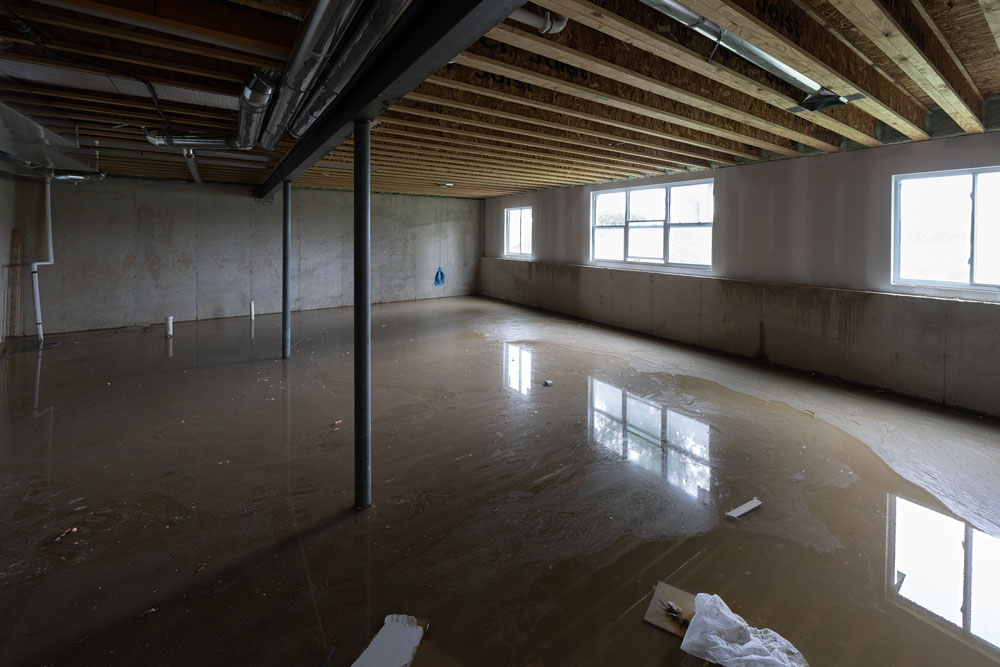How To Clean A Flooded Basement
 CONTENTS
CONTENTS
- What to do when your basement floods
- The dangers of flood cleaning
- The benefits of professional flood clean up
- How to prevent your basement flooding
- Get in touch
Dealing with a flooded basement can be overwhelming and dangerous if not tackled correctly. It is recommended you bring in flood damage professionals immediately after flooding to begin the process of drying out and deep cleaning your home.
Here at ICE Cleaning, we have flood restoration specialists available across the UK who can be on site within a matter of hours in an emergency. Our comprehensive service can quickly make your home a safe and clean space again.
Read on learn more about what to do when your basement floods.
What to do when your basement floods
First, turn off all electrical power and gas supply to the basement. Next, identify the cause of the flood and stop it if possible, such as fixing a broken pipe or sealing the leak, or stopping the water ingress.
You then need to remove the standing water. To effectively lower water levels, specialist pumps and wet vacuums are required.
Once the water has been removed, drying out the area thoroughly is essential to prevent mould growth and minimise potential damage. Commercial-grade dehumidifiers and fans are most effective for this purpose.
The property will then need to be thoroughly cleaned to remove any dirt, debris, and pathogens that the floodwater may have introduced into your home. Depending on the source of the floodwater, it may contain sewage, chemicals, and animal faeces. You can learn more about the dangers of exposure to sewage here.
The dangers of flood cleaning
Flooded basement clean up is an extensive, dangerous process that is best left to professionals. The main danger comes from exposure to floodwater which may be contaminated with harmful bacteria and viruses. Floodwater may also contain dangerous debris like sharp objects which can cause injuries.
Personal protective equipment (PPE) is essential for anyone involved in the restoration process to ensure they do not touch, ingest, or inhale contaminated water or air.
Failing to effectively clean up the flood damage is dangerous, too. Without the right tools or knowledge, you could overlook critical damage which may compromise the structural integrity of your home. You may also not thoroughly dry out or clean the property, and could allow pathogens to fester or water damage to worsen.
Flood damage that is not dealt with effectively immediately can also result in mould growth. Mould is a harmful fungus that can put people at risk of a range of health problems including allergic reactions, respiratory infections, and sick building syndrome. You can learn more about the dangers of mould in this blog.
The benefits of professional flood clean up
Flood restoration professionals can give you peace of mind your home will soon be returned to normal. They will have the high-powered equipment capable of efficiently extracting water and drying out a property including pumps, vacuums, industrial-grade dehumidifiers, and air movers.
This equipment will also help them deal with the flood much faster than DIY methods. This is crucial to prevent mould as it can start growing within 24 to 48 hours. You can find out how to prevent mould during flood cleaning here.
Specialist cleaners will also have the PPE and expertise to safely and thoroughly eliminate any moisture and pathogens. They can even provide mould remediation services should they be required.
How to prevent your basement flooding
Whether caused by heavy rain, an overflowing river, or a burst pipe, there are lots of things you can do to protect your basement against flooding.
Maintain gutters and downspouts
Cleaning gutters regularly ensures that water flows away from your home's foundation. Blocked gutters can overflow, leading water towards the basement walls where it can seep inside. Extending downspouts at least three meters away from the house helps divert rainwater further away, reducing the risk of basement flooding.
Install a sump pump
A sump pump removes accumulated water in the sump basin commonly found in basements or crawl spaces of homes. It acts as a first line of defence against rising groundwater levels during heavy rainfall or snow melts. Testing the sump pump annually before rainy seasons start is crucial for ensuring its functionality when needed most.
Have the landscape around your home graded
The land surrounding your home should slope away from its foundation to help drain rainwater outwards rather than letting it pool near the base walls. Otherwise, it could penetrate into the basement area through cracks or holes.
Incorporate waterproofing measures
Applying waterproof sealants on exterior basement walls blocks moisture penetration caused by external hydrostatic pressure.
An additional protective layer, such as a French drain system installed around the perimeter of the property, directs incoming surface groundwaters safely back into natural underground channels, too.
Get in touch
No matter where you are in the UK, we can help. Our industry-accredited experts can take care of the entire restoration process for you.
To learn more about our flood damage cleaning service, just give us a call on 0208 066 0360 or send an email to enquiries@icecleaning.co.uk.

Speak with me today,
I’m here to help
By asking you a few questions either via phone or email I can immediately provide a realistic estimation of the cost.

Why choose us?
- Cater to a wide variety of cleaning situations
- Nationwide coverage, available 24/7
- Cater to commercial and domestic clients
- Free survey provided prior to quotation
- Emergency response team
- Offer a bespoke service designed to suit all your needs
- All technicians hold professional health and safety qualifications, including BICSc, IOSH, Dewpoint Professional & Safe Contractor
We’re fully accredited
We place best practise, professional expertise and health and safety at the core of our business. We’re fully compliant with all legal obligations. You can view a list of our accreditations below, or visit our Health & Safety page for more information.











-RGB-small.1707319151.jpg)




















